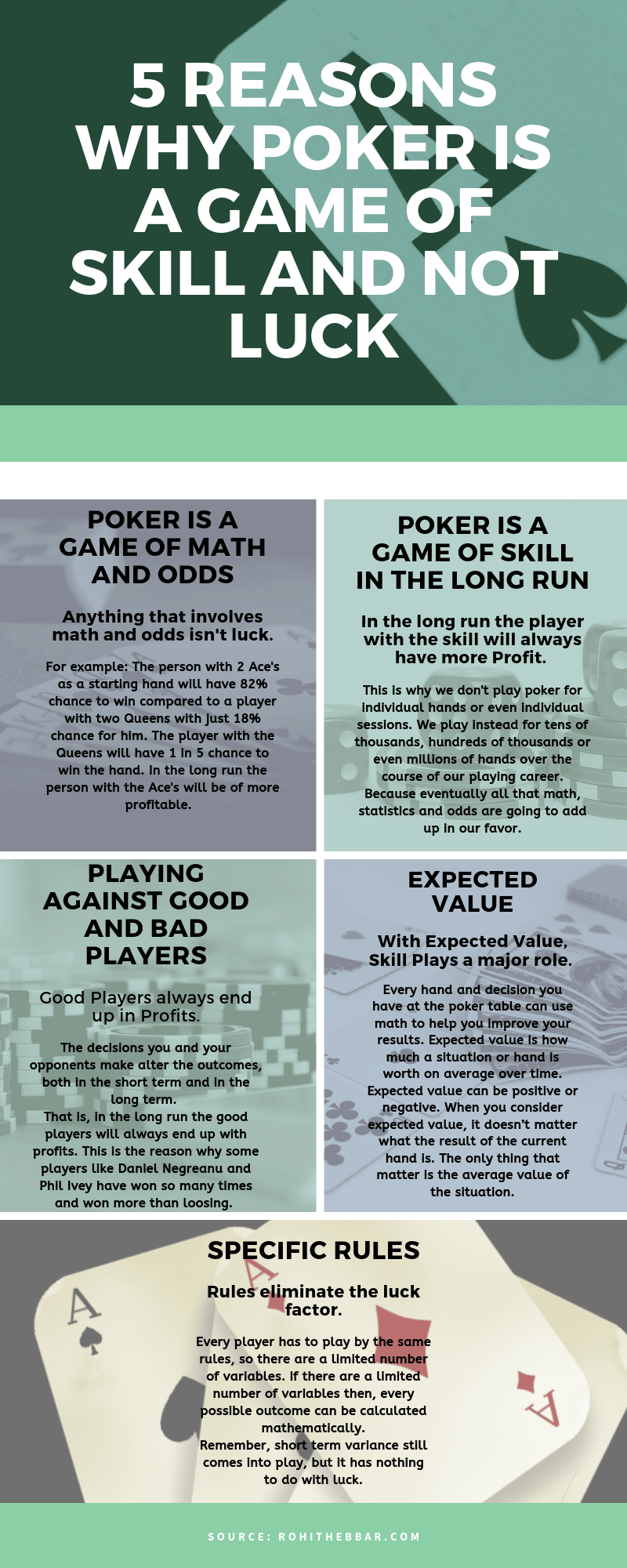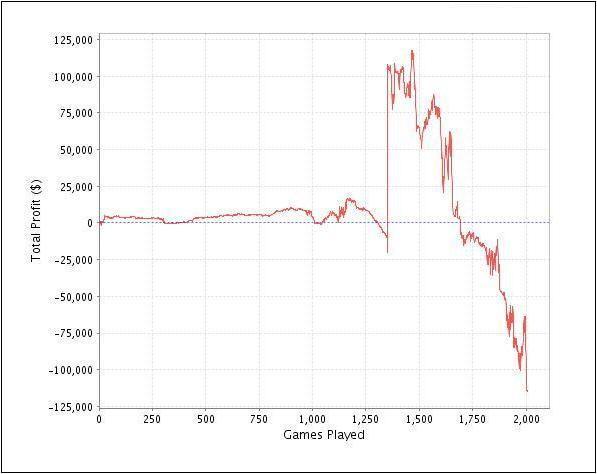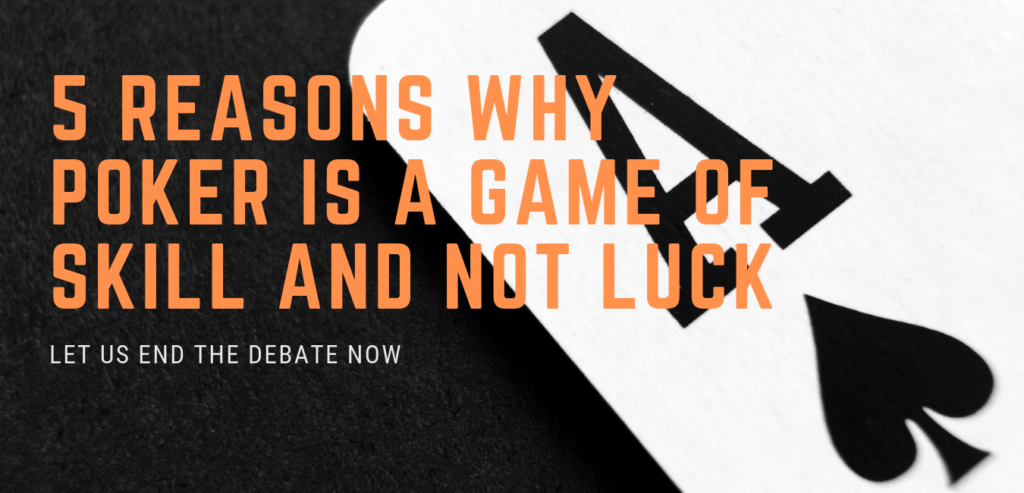Is poker game of skill or luck? This question has been debated forever now. But today, I am going to clear to you that poker indeed is a game of skill and not luck. I am also going to provide reasons as to why poker is a game of skill and not luck.
Now, if you ask the same question to the majority of the people, they are going to tell you that poker is a game of luck. But again if you ask the same question to any professional poker players they would argue that poker is a game of skill and not luck. Now, why is this? What do professional poker players know that common people don’t know?
In short, Poker, when played for a shorter duration of time, is mostly depended on luck. But, the more you play, the more poker is a game of skill. Most of the people would have played poker for only a shorter period of time. But the professional poker players would have spent years playing the game. Since they have played the game for a long time, they would tell you that poker is a game of skill and not luck. I will explain this clearly in the coming sections.
Now, let us take a look at the 5 reasons as to why poker is a game of skill and not luck.
Similar: Top Poker Tournaments that pay big.
Table of Contents
5 Reasons as to Why Poker is a game of skill and not Luck

1. Poker is a Game of Math and Odds
If you have played poker, then you know how much difference it does with the cards you have compared to the opponents. If cards can affect the game to a certain degree, then it is not luck anymore. Yes, there still leaves a small amount of luck in the short run. But the probability always stands correct in the long run of the game.
What I mean by this is that, if a person has A-A as their starting hands and the opponent has Q-Q as their starting hands, Then the person with the A-A will win 4 out of 5 times. Yes, there is that one time that the person with Q-Q can win. Hence in the short run, poker is a game of luck. But, you will be left with profit in the long run for the same hand.
What this tells us is that any game that involves probability and Odds is not luck anymore. It is based on the calculated risks you take and the skill required in doing that. This tells us that poker is a game of skill and not luck.
2. Poker is a game of skill in the Long Run
Poker is a game of skill in the long run. I have already touched on this before. But, what do I mean by this? It’s really simple. The more poker hands you play, the more skill-based the game becomes. As the number of hands played reaches infinity, the skill required to win these hands would reach 100%. Logically speaking this is not possible. But you get the point. Because, eventually the math, statistics, and the odds are going to stack up in your favor in the long run. This article will help you explain further why in the long run skill matters.
I will share some of the graphs that prove my point. I’ll share two graphs of a player with skill and a player with skill.

This graph shows that in the long run a player with skill always ends up in profit than loss. Take a look at the graph. The player has played more than 300,000 hands and still is up with profits. This tells us that this player is pretty skilled at playing the game. To end up in profits even after playing 300,000 hands is not luck.

This graph is a perfect example of a player without skill. You can see that the graph till the 1000 hand mark was a pretty straight line. But suddenly he got his lucky breakthrough and won almost $ 100,000 in profit. But, the more hands he played the more he lost than he won. Now, he has ended in a loss than profit. This is a perfect example of poker is a game of skill.
3. Playing against Good and Bad Players
Now, in general, any game that involves luck doesn’t involve good or bad players. Any player without any skill should be able to win the game. But, in Poker the game involves good and bad players. The decisions they take in the game matters a lot on the outcome of the game. A player that can take a better decision is better than the player that doesn’t take a good decision.
In the long run, the decisions taken by the good players are always helpful and they usually end up in profits. But, similarly, a player that doesn’t take good decisions ends up in loss. Now, we can all agree that if any decisions are involved then the game is definitely not a luck-based, but based on skill.
But the crazy short term variance that can happen in poker sometimes can still mess with the mind of even the most highly skilled and experienced players. But, it’s okay. In the long run, those players would end up in profit anyways. There is a reason why the top of the poker is dominated by the same players again and again. Phil Hellmuth has won the WSOP 15 times. If luck was involved no player could win that much time. He is incredibly skilled and has shown by winning the WSOP bracelet 15 times in his career. This again proves us that poker is a game of skill and not luck.
4. Expected Values
As I had mentioned earlier poker is a game involving Probability and odds. Every hand and decision you have at the poker table can use math to help you improve your results. Expected Value is how much a situation or hand is worth on average over time.
Expected value can be positive or negative. When you consider expected value, it doesn’t matter what the result of the current hand is. The only thing that matter is the average value of the situation. And thus over an extent of time, a player with skills will end up winning a particular situation if he didn’t in the beginning. This again reflects the fact that over the longer period of time skilled players will always end up in profits. This is also a good indicator that poker is a game of skill and not luck.
5. Specific Rules
As you know poker involves certain rules that need to be followed. Without the rules the game is unplayable. Also, when rules are present, it is applicable to all the players playing the game. Since every player has to play by the rules, there is limited variables that affect the game. With limited variables, the probability can be calculated in mind. And a player that does this better has a better chance at winning the game. Also with limited variables, every possible outcome can be calculated and you can play accordingly. Again this proves us that poker is a game of skill and not luck.
In conclusion, any game that involves rules and variables is not luck-based. The reason is that everything can be calculated and is well within the rules to take advantage of that. Any player that doesn’t calculate the probability will complain that the poker is nothing but a game of skill. But, now we know that this is not true. Remember short term variance still comes into the picture, but it has nothing to do with luck. Poker is indeed a game of skill and not luck.
Similar: Poker Odds Calculator
My Take On This
So, I just stated the different reasons as to why poker is a game of skill and not luck. What do I take on all this? Yes, the stats and the data shows us that poker is more luck-based when played for a short amount of time. A hand with a 90% chance of winning can lose 10% of the time. What does this means is that out of 100 times the hand with 90% chance will lose 10 times. So, the remaining 90 times the hand with 90% chance will win.
This tells us that a player in a short run might end up lucky. But, in the long run the player with the 90% chance will always end up in profit. This alone is enough to tell us that Poker is a game of skill and not luck.
I hope you guys have got the answer you are looking for. Thanks for reading. Have a great day. Please check out other posts similar to this.

I am the owner of the site rohithebbar.com. I love playing poker and other card games.





